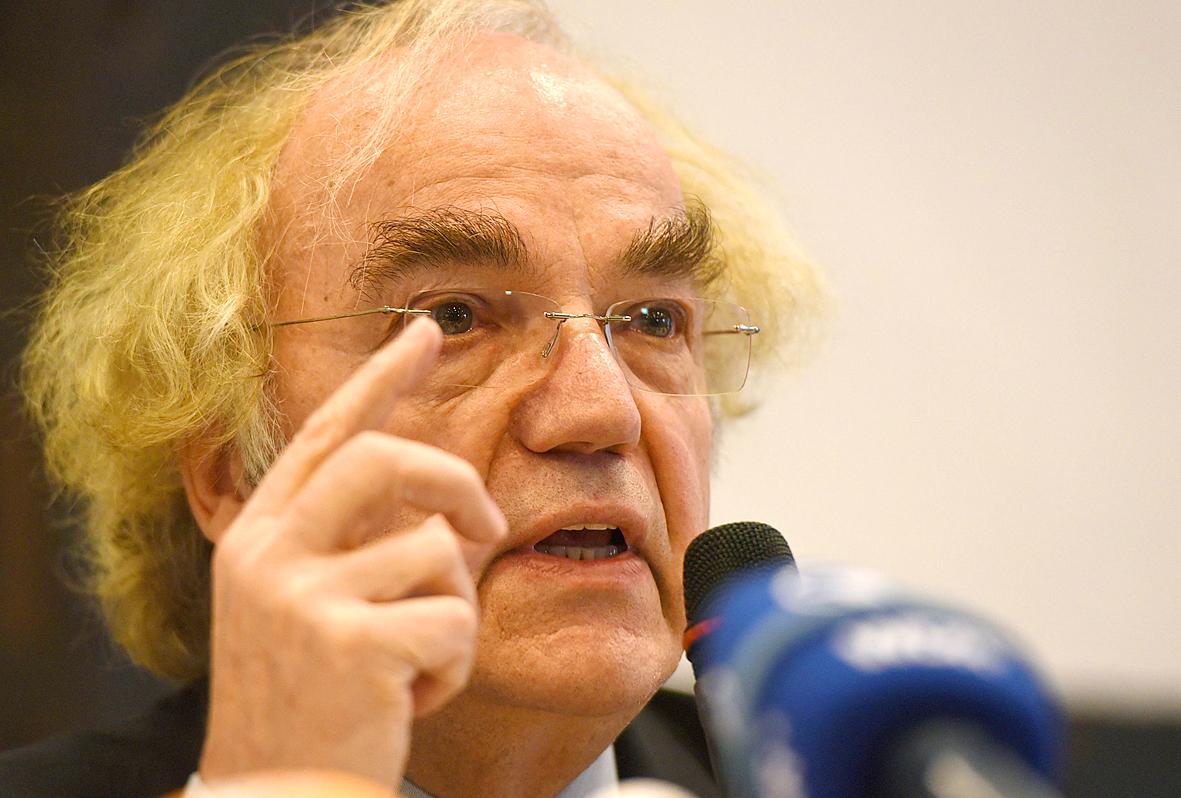Lawyer Thomas Walther, 78, gets prickly when he hears criticism of German courts putting elderly surviving Nazis — many over 90 years old now — on trial.
“No one voices any doubts when charges are filed over a murder after 30 years,” he says.
“But the prosecution of old men and old women is somehow viewed as problematic after 75 years, even if it’s about 1,000 or 5,000 murders in which active assistance was provided by the accused.”

Photo: AFP
Justice has “no expiry date,” stresses the lawyer, who has led the way on a series of twilight justice cases in Germany against the last surviving Nazis.
It was due to a case Walther put before the courts in the early 2000s that jurisprudence was set in 2011, allowing investigators to prosecute Nazi staff on the basis they had served as part of Adolf Hitler’s extermination machine.
Another of his cases will today be reaching the court.

Photo: AP
The trial of Josef S, now 100 years old, accused of complicity in the murder of 3,518 prisoners between 1942 and 1945 at Sachsenhausen concentration camp will open. Walther is representing survivors of the horrors and their relatives.
The long-term prosecutor and later judge has dedicated his retirement years to bringing justice, even if late, to victims of the Holocaust and their descendants.
Besides “the relatives of those killed, countless families that have been completely wiped out too have the right to this late justice”, he says.
DETERRENCE
Located about 30km north of Berlin, the Sachsenhausen camp held 200,000 detainees between 1936 and 1945, mainly opposition figures, Jews and gays.
Tens of thousands of inmates died from forced labor, murder, medical experiments, hunger or disease before the camp was liberated by Soviet troops, according to the Sachsenhausen Memorial and Museum.
The accused, who lives in Brandenburg, has refused to make public comments about the trial. Aged 21 in 1942, he was a chief corporal at the camp.
“The higher ranked officers have died... only those of lower ranks can theoretically still be alive today” and brought to justice, says Walther.
The German lawyer collects witness accounts from across the world that have helped to launch these last proceedings.
In the 2000s, while he was still a magistrate, he put forward the file that led to the 2011 conviction of John Demjanjuk, 90, a former guard at Sobibor camp.
Since then, courts have handed down several guilty verdicts on the grounds that the defendant served as part of the Nazi killing machine rather than for murders or atrocities directly linked to the individual accused.
In the early years after WWII, there was a general reluctance to pursue former Nazis, many of whom remained in key administrative and judicial positions.
Germans were focused on rebuilding a country in ruins, and many remained in denial about past crimes, dismissing the 1945-49 Nuremberg trials as “victor’s justice”.
“I know all the possible means used by prosecutors and judges 30 or 40 years ago to abandon proceedings or to deliver acquittals on Nazi crimes,” says Walther.
“Such practices have nothing to do with law and justice.”
For Walther, the trials serve as valuable deterrence even today.
“It is always a reminder for the present — there are places and actions one can’t be a part of.”

The Democratic Progressive Party (DPP), Chinese Nationalist Party (KMT), and the country’s other political groups dare not offend religious groups, says Chen Lih-ming (陳立民), founder of the Taiwan Anti-Religion Alliance (台灣反宗教者聯盟). “It’s the same in other democracies, of course, but because political struggles in Taiwan are extraordinarily fierce, you’ll see candidates visiting several temples each day ahead of elections. That adds impetus to religion here,” says the retired college lecturer. In Japan’s most recent election, the Liberal Democratic Party lost many votes because of its ties to the Unification Church (“the Moonies”). Chen contrasts the progress made by anti-religion movements in

Taiwan doesn’t have a lot of railways, but its network has plenty of history. The government-owned entity that last year became the Taiwan Railway Corp (TRC) has been operating trains since 1891. During the 1895-1945 period of Japanese rule, the colonial government made huge investments in rail infrastructure. The northern port city of Keelung was connected to Kaohsiung in the south. New lines appeared in Pingtung, Yilan and the Hualien-Taitung region. Railway enthusiasts exploring Taiwan will find plenty to amuse themselves. Taipei will soon gain its second rail-themed museum. Elsewhere there’s a number of endearing branch lines and rolling-stock collections, some

Could Taiwan’s democracy be at risk? There is a lot of apocalyptic commentary right now suggesting that this is the case, but it is always a conspiracy by the other guys — our side is firmly on the side of protecting democracy and always has been, unlike them! The situation is nowhere near that bleak — yet. The concern is that the power struggle between the opposition Chinese Nationalist Party (KMT) and their now effectively pan-blue allies the Taiwan People’s Party (TPP) and the ruling Democratic Progressive Party (DPP) intensifies to the point where democratic functions start to break down. Both

This was not supposed to be an election year. The local media is billing it as the “2025 great recall era” (2025大罷免時代) or the “2025 great recall wave” (2025大罷免潮), with many now just shortening it to “great recall.” As of this writing the number of campaigns that have submitted the requisite one percent of eligible voters signatures in legislative districts is 51 — 35 targeting Chinese Nationalist Party (KMT) caucus lawmakers and 16 targeting Democratic Progressive Party (DPP) lawmakers. The pan-green side has more as they started earlier. Many recall campaigns are billing themselves as “Winter Bluebirds” after the “Bluebird Action”